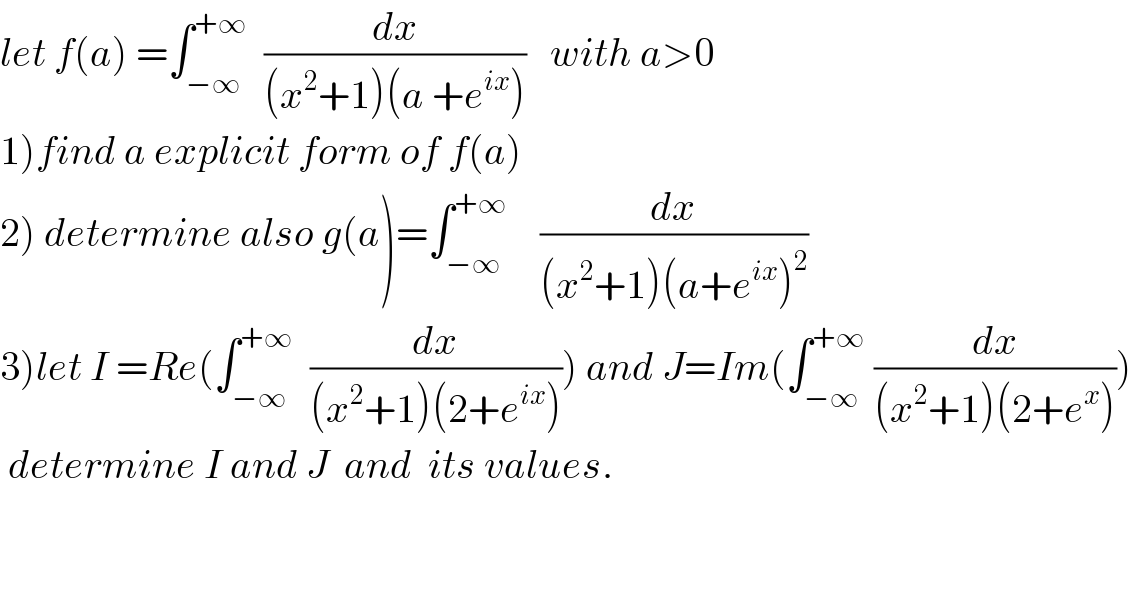
Question Number 67542 by mathmax by abdo last updated on 28/Aug/19

$${let}\:{f}\left({a}\right)\:=\int_{−\infty} ^{+\infty} \:\:\frac{{dx}}{\left({x}^{\mathrm{2}} +\mathrm{1}\right)\left({a}\:+{e}^{{ix}} \right)}\:\:\:{with}\:{a}>\mathrm{0} \\ $$ $$\left.\mathrm{1}\right){find}\:{a}\:{explicit}\:{form}\:{of}\:{f}\left({a}\right) \\ $$ $$\left.\mathrm{2}\right)\:{determine}\:{also}\:{g}\left({a}\right)=\int_{−\infty} ^{+\infty} \:\:\:\:\frac{{dx}}{\left({x}^{\mathrm{2}} +\mathrm{1}\right)\left({a}+{e}^{{ix}} \right)^{\mathrm{2}} } \\ $$ $$\left.\mathrm{3}\right){let}\:{I}\:={Re}\left(\int_{−\infty} ^{+\infty} \:\:\frac{{dx}}{\left({x}^{\mathrm{2}} +\mathrm{1}\right)\left(\mathrm{2}+{e}^{{ix}} \right)}\right)\:{and}\:{J}={Im}\left(\int_{−\infty} ^{+\infty} \:\frac{{dx}}{\left({x}^{\mathrm{2}} +\mathrm{1}\right)\left(\mathrm{2}+{e}^{{x}} \right)}\right) \\ $$ $$\:{determine}\:{I}\:{and}\:{J}\:\:{and}\:\:{its}\:{values}. \\ $$
Commented by~ À ® @ 237 ~ last updated on 29/Aug/19
![let change x=tanu f(a)=∫_(−(π/2)) ^(π/2) (du/(h(u))) with h(u)=a+e^(itanu) g has only one root on [((−π)/2);(π/2)] let named it θ When using the RT f(a)=2πiRes((1/h),θ) =((2iπ)/(h′(θ)))=((2iπ)/(i(1+tan^2 θ)e^(itanθ) )) θ root of h ⇒ e^(itanθ) =−a and tanθ=π−ilna So f(a)=((2π)/(−a(1+π^2 +(lna)^2 −2πilna))) we can ascertain that g(a)=(df/da) When stating x(a)=1+π^2 +(lna)^2 and y(a)=2πlna Re(f(a))=−((2π)/a) ((x(a))/(x^2 (a)+y^2 (a))) and Im(f(a))=((−2π)/a) ((y(a))/(x^2 (a)+y^2 (a)))](Q67583.png)
$${let}\:{change}\:{x}={tanu}\: \\ $$ $${f}\left({a}\right)=\int_{−\frac{\pi}{\mathrm{2}}} ^{\frac{\pi}{\mathrm{2}}} \:\:\frac{{du}}{{h}\left({u}\right)}\:\:\:\:\:\:\:\:{with}\:\:\:{h}\left({u}\right)={a}+{e}^{{itanu}} \:\:\:\:\: \\ $$ $${g}\:{has}\:{only}\:{one}\:{root}\:{on}\:\left[\frac{−\pi}{\mathrm{2}};\frac{\pi}{\mathrm{2}}\right]\:{let}\:{named}\:{it}\:\:\theta \\ $$ $${When}\:{using}\:{the}\:{RT}\:\: \\ $$ $${f}\left({a}\right)=\mathrm{2}\pi{iRes}\left(\frac{\mathrm{1}}{{h}},\theta\right)\:=\frac{\mathrm{2}{i}\pi}{{h}'\left(\theta\right)}=\frac{\mathrm{2}{i}\pi}{{i}\left(\mathrm{1}+{tan}^{\mathrm{2}} \theta\right){e}^{{itan}\theta} }\: \\ $$ $$\theta\:{root}\:{of}\:{h}\:\Rightarrow\:{e}^{{itan}\theta} =−{a}\:\:{and}\:\:{tan}\theta=\pi−{ilna} \\ $$ $${So}\:\:{f}\left({a}\right)=\frac{\mathrm{2}\pi}{−{a}\left(\mathrm{1}+\pi^{\mathrm{2}} +\left({lna}\right)^{\mathrm{2}} −\mathrm{2}\pi{ilna}\right)} \\ $$ $${we}\:{can}\:{ascertain}\:{that}\:\:{g}\left({a}\right)=\frac{{df}}{{da}}\: \\ $$ $${When}\:{stating}\:\:{x}\left({a}\right)=\mathrm{1}+\pi^{\mathrm{2}} +\left({lna}\right)^{\mathrm{2}} \:\:{and}\:\:{y}\left({a}\right)=\mathrm{2}\pi{lna}\: \\ $$ $${Re}\left({f}\left({a}\right)\right)=−\frac{\mathrm{2}\pi}{{a}}\:\frac{{x}\left({a}\right)}{{x}^{\mathrm{2}} \left({a}\right)+{y}^{\mathrm{2}} \left({a}\right)}\:\:{and}\:{Im}\left({f}\left({a}\right)\right)=\frac{−\mathrm{2}\pi}{{a}}\:\frac{{y}\left({a}\right)}{{x}^{\mathrm{2}} \left({a}\right)+{y}^{\mathrm{2}} \left({a}\right)}\: \\ $$
Commented bymathmax by abdo last updated on 29/Aug/19

$${thank}\:{you}\:{sir}. \\ $$
Commented bymathmax by abdo last updated on 29/Aug/19

$$\left.\mathrm{1}\right){let}\:{consider}\:{tbe}\:{complex}\:{function}\:{W}\left({z}\right)=\frac{\mathrm{1}}{\left({z}^{\mathrm{2}} \:+\mathrm{1}\right)\left({a}\:+{e}^{{iz}} \right)} \\ $$ $$\Rightarrow{W}\left({z}\right)\:=\frac{\mathrm{1}}{\left({z}−{i}\right)\left({z}+{i}\right)\left({a}+{e}^{{iz}} \right)}\:\:{the}\:{poles}\:{of}\:{W}\:{are}\:{i}\:{and}\:−{i} \\ $$ $${residus}\:{theorem}\:{give}\:\int_{−\infty} ^{+\infty} \:{W}\left({z}\right){dz}\:=\mathrm{2}{i}\pi\:{Res}\left({W},{i}\right) \\ $$ $${Res}\left({W},{i}\right)\:={lim}_{{z}\rightarrow{i}} \:\left({z}−{i}\right){W}\left({z}\right)\:=\frac{\mathrm{1}}{\left(\mathrm{2}{i}\right)\left({a}+{e}^{−\mathrm{1}} \right)}\:\Rightarrow \\ $$ $$\int_{−\infty} ^{+\infty} \:{W}\left({z}\right){dz}\:=\mathrm{2}{i}\pi×\frac{\mathrm{1}}{\mathrm{2}{i}\left({a}+{e}^{−\mathrm{1}} \right)}\:=\frac{\pi}{{a}+{e}^{−\mathrm{1}} }\:=\frac{\pi{e}}{{ae}\:+\mathrm{1}}\:\Rightarrow \\ $$ $${f}\left({a}\right)\:=\frac{\pi{e}}{{ae}\:+\mathrm{1}}\:\:{with}\:{a}>\mathrm{0} \\ $$ $$\left.\mathrm{2}\right)\:{we}\:{have}\:\:{f}^{'} \left({a}\right)\:=−\int_{−\infty} ^{+\infty} \:\:\:\frac{{dx}}{\left({x}^{\mathrm{2}} \:+\mathrm{1}\right)\left({a}+{e}^{{ix}} \right)^{\mathrm{2}} }\:=−{g}\left({a}\right)\:\Rightarrow \\ $$ $${g}\left({a}\right)\:=−{f}^{'} \left({a}\right)\:\:\:{but}\:{f}\left({a}\right)\:=\frac{\pi{e}}{{ae}\:+\mathrm{1}}\:\:\Rightarrow{f}^{'} \left({a}\right)\:=−\frac{\pi{e}^{\mathrm{2}} }{\left({ae}\:+\mathrm{1}\right)^{\mathrm{2}} }\:\Rightarrow \\ $$ $${g}\left({a}\right)\:=\frac{\pi{e}^{\mathrm{2}} }{\left({ae}\:+\mathrm{1}\right)^{\mathrm{2}} }\:. \\ $$ $$ \\ $$
Commented bymathmax by abdo last updated on 29/Aug/19

$$\left.\mathrm{3}\right)\:{we}\:{have}\:{f}\left({a}\right)\:=\int_{−\infty} ^{+\infty} \:\:\frac{{dx}}{\left({x}^{\mathrm{2}} \:+\mathrm{1}\right)\left({a}\:+{cosx}\:+{isinx}\right)} \\ $$ $$=\int_{−\infty} ^{+\infty} \:\:\frac{{a}+{cosx}−{isinx}}{\left({x}^{\mathrm{2}} \:+\mathrm{1}\right)\left(\left({a}+{cosx}\right)^{\mathrm{2}} +{sin}^{\mathrm{2}} {x}\right)}{dx} \\ $$ $$=\int_{−\infty} ^{+\infty} \:\:\frac{{a}+{cosx}}{\left.\left({x}^{\mathrm{2}} \:+\mathrm{1}\right)\left\{{a}^{\mathrm{2}} \:+\mathrm{2}{acosx}\:+\mathrm{1}\right)\right\}}{dx}\:−{i}\:\int_{−\infty} ^{+\infty} \:\:\:\:\frac{{sinx}}{\left({x}^{\mathrm{2}} \:+\mathrm{1}\right)\left\{\:{a}^{\mathrm{2}} \:+\mathrm{2}{acosx}\:+\mathrm{1}\right\}}{dx} \\ $$ $$\Rightarrow\:{Re}\left({f}\left({a}\right)\right)\:=\int_{−\infty} ^{+\infty} \:\:\:\frac{{a}+{cosx}}{\left({x}^{\mathrm{2}} \:+\mathrm{1}\right)\left\{\:{a}^{\mathrm{2}} \:+\mathrm{2}{acosx}\:+\mathrm{1}\right\}}{dx}\:{and} \\ $$ $${Im}\left({f}\left({a}\right)\right)\:=\int_{−\infty} ^{+\infty} \:\:\frac{{sinx}\:{dx}}{\left({x}^{\mathrm{2}} \:+\mathrm{1}\right)\left\{{a}^{\mathrm{2}} \:+\mathrm{2}{acosx}\:+\mathrm{1}\right\}}=\mathrm{0}\:{because}\:{the}\: \\ $$ $${function}\:{x}\:\rightarrow\frac{{sinx}}{\left({x}^{\mathrm{2}} \:+\mathrm{1}\right)\left\{{a}^{\mathrm{2}} \:+\mathrm{2}{a}\:{cosx}\:+\mathrm{1}\right\}}\:{is}\:{odd}. \\ $$
